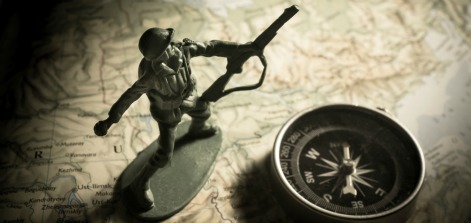I suppose I was a war widow, differant to above. I had been married 3 months when My husband went to war in the Falklands. I was going out with him when he was sent to Northern ireland twice with my brother, their were the best of mates. I wrote a bluey everyday when he was in ireland bothtimes. That was hard for the wives left back home. No-one knew what I was going through or my brothers girl friend. We didn't get to know anything, because we were only girl friends, and it would be they parents that would get told, well my dad would have told me, but I wasn't on the phone, and I only rang my dad when ever????
When I got married, I was in Married quarters then, so it was a bit differant then, because we were in quarters, and we had officers who stayed behind, all the officers wifes, who were in the know all the time. We as an army wife not so much in the know. I watched the ships getting blown up on the TV, I watched it, and you half expected a knock on the door. You knew what was going to happen if your hubby was injured or worse a black military car would park outside the house and 2 officers would go in to the house. You got a lot of support, and things moved quickly once you hadn't got a hubby, they worked with you and the family to get you off the barracks, nothing worse for a grieving wife, to be in the quarters when the men came back, its was done in the nicest possible way. My brother managed to fall of the side of an argy bargy wagon, only him would go 8,000 miles to fall of a wagon, he didn't get sent home, light duties, funny I wasn't told about him, theye told his wife and she didn't live on the camp quarters, she had stayed in her own house when they got married. So I heard, when I rang my sister, and she said oh have you heard about Les Nope why? and then I got the tale of him falling off the argy bargy wagon, it sounded funny typical of my brother. I went to wave my brother and hubby off at the camp but coming home, my brother came home about a month before my hubby, so I didn't go and meet him on the coaches, because, my hubby could have been on the next flight, and I would have been on the coach coming back with my brother, when the coaches went down to meet my hubby. The time seemed endless, but the fighting had finished so then it was different it was like hubby going away in peace time, but still we didn't get to know anything like they will be home on the ?? you just waited until the squandron land rover came round and knocked on your door, hubby due home day after tomorrow coaches leaving at ????? to meet the plane. My hubby came back into Brize Norton so we went down to meet them, once back you look at the mountain of kit I had to wash, you knew he was home in more ways than one, the girls were asking, daddy did you get shot at cos so and so from school said you did and you were going to die., No not me said daddy, I was to quick for the argy bargies, and I didn't fall of the wagon like your uncle Leslie, wasn't he so silly, subject changed again. Children at school didn't really know or mean when he was telling the army children, your dad is getting shot at? did you see that boat last night, your dad was on there. Kids can be hurtful. It was peace time in UK, the war was on the Falklands and the above stories are the WW1 and WW11 and it must have been awful living with the bombs dropping.



